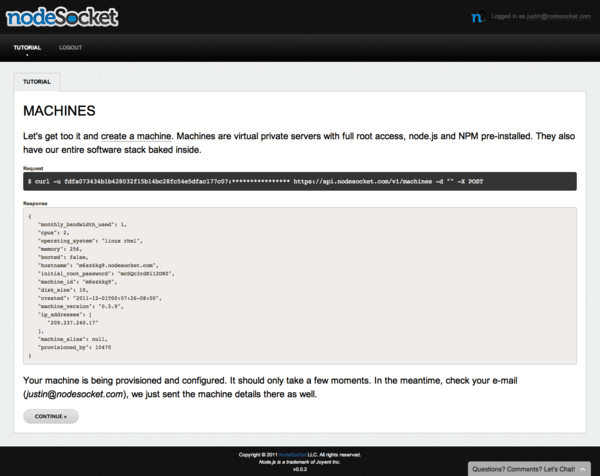Node.js is not only attracting a lot of developer interest, it’s also proving interesting to entrepreneurial types. Case in point, NodeSocket, a Node.js hosting business that’s in development. NodeSocket bills itself as a “hosting platform and community for developers.” Currently in private beta, NodeSocket is a hybrid service play that will offer pre-configured VPSes with Node.js set up for easy application deployment.

Founder Justin Keller says that NodeSocket isn’t a PaaS play. NodeSocket gives users the ability to create one or more VPSes with full root access to modify and install packages. Node.js Package Manager (NPM) is installed by default.
“This allows the flexibility to install things like MongoDB or Redis locally on the same server that is running their node.js applications, but at the same time, utilize our software platform and API’s to abstract away the pains of setting up blank VM’s on say Amazon EC2,” says Keller.
NodeSocket, says Keller, is a “mash-up of Infrastructure-as-a-Service and a Platform-as-a-Service.” Users get a VPS with root access, but also “the nice soft and fluffy layer of abstraction that users demand. Users have the keys to the kingdom, they can stay abstracted and use the control panel and API’s, or if they choose, get their hands a bit dirty, SSH into machines, and have full control over their environment.”
The service, says Keller, will have an “amazing” control panel to take the pain out of provisioning. The company is also planning an integrated logging solution for Node.js apps.

Keller says that it’s currently “a very personal interaction where we set them up, one-on-one via a Web chat sessions” so expect that invites will be slow in coming for a while. But Keller did say that they’ll be launching an automated system “shortly” with “a really slick tutorial system.”
Pricing and general availability for NodeSocket is still up in the air. He did note that the VPSes will not be one-size-fits all, and eventually users will be able to choose from different instances (much like AWS EC2 instances). Keller says that launch is “at least a few months away” so don’t expect to be putting apps into production on NodeSocket in 2011.
Between IaaS and PaaS, GitHub and Going Alone
Note that NodeSocket isn’t going to be the only game in town for Node.js application deployment. Engine Yard introduced Node.js support through its Labs program in November, and there’s also Nodejitsu which is also in “extended private beta.”
The NodeSocket infrastructure is based in San Francisco, and NodeSocket is managing its own hardware and infrastructure rather than building on top of Amazon Web Services (AWS), Rackspace or another IaaS provider. Keller says that this is to provide better performance and pricing than they’d get with an IaaS provider.
Keller is also promising a “community” aspect to NodeSocket, saying that users will be able to share Node.js applications with one another “simply and powerfully.” This includes sharing custom images of servers that have Node.js applications pre-installed.
There’s plenty of room in the growing Node.js market to support multiple Node.js services. I do wonder whether NodeSocket will be able to hit a critical mass of Node.js users, and whether it might make more sense to integrate more closely with GitHub rather than trying to build its own island of Node fans. Keller says that NodeSocket will support remote git repos and GitHub, to be clear. But trying to build community from scratch is a tough nut to crack.
Look for more from NodeSocket next year. If you’re a Node.js developer, does this sound like a service that’d meet your needs?






